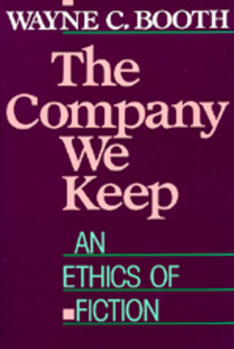The Company We Keep
Select Format
Select Condition 
Book Overview
In The Company We Keep, Wayne C. Booth argues for the relocation of ethics to the center of our engagement with literature.
But the questions he asks are not confined to morality. Returning ethics to its root sense, Booth proposes that the ethical critic will be interested in any effect on the ethos, the total character or quality of tellers and listeners. Ethical criticism will risk talking about the quality of this particular...
Format:Paperback
Language:English
ISBN:0520062108
ISBN13:9780520062108
Release Date:December 1989
Publisher:University of California Press
Length:580 Pages
Weight:1.70 lbs.
Dimensions:1.4" x 6.4" x 8.9"
Customer Reviews
2 ratings
required reading for anyone who cares about literature
Published by Thriftbooks.com User , 19 years ago
In his usual thorough, encyclopedic way, Booth discusses many of the issues concerning the effects of fiction in the real world on real people. And as usual, he bends over backward to be fair to everybody. He gives patient, exhaustive treatments of all arguments and claims, even the most idiotic, showing their inadequacies. But people who put forth idiotic arguments do not do so because they are stupid but because they are committed, and committed people do not respond to reason, however patient and thorough. Still, there is much thought-provoking material here, and the book should be read by all readers interested in the personal and social effects of literature. Booth is weakest when dealing with philosophical issues (because he is not a philosopher). His confusions about subjectivism and relativism are cases in point. For a competent discussion of these and the other ethical (i.e. value-theoretic) issues, readers would be better advised to get A Book Worth Reading. But as a compendium of arguments "clearing away the dead wood" and for his many thought-provoking discussions, Booth is impossible to beat.
Matchless
Published by Thriftbooks.com User , 19 years ago
Muddled in endless cultural anxieties, or battling feverishly in various intellectualized ghettos of fashionable cultural politics and so many psychoanalyticalisms or poststructuralisms, most contemporary literary critics and historians fail to provide us with truly original substantive insights based on a union of thorough close reading, historical contexting and ethical speculation. Instead critics today impose a theoretical template upon works as if they are writing only for their present-day colleaques and the hidden forces of tenure and promotion. Nor do these critics seem to have an unparalleled mastery of many, many, many books--wide, volumnious reading that used to be called "generalism"--and those books' inner workings. Yes, all critics write from their own cultural bias and historical location. Yes, all texts hew from particular milieus. Yet, Professor Booth demonstrates that there is such a thing as original thinking about literature and literary technique that *does not* make the mistake of imposing a speculative template at the expense of unexpected analytical power and unique theses. Professor Booth has a lifelong project that bears up to present day and future inquiry. He writes for the ages. Literally, he has read most major and minor British, American, and major European fiction from the Renaissance forward and the major theories that arise around them, including the "classical" Greco-Roman theories that undergird so much of current critical thinking in Western European and American academies. This undergirding "classical" thought is largely unknown, yes, to many junior scholars raised on the isms and jargons of today. These junior scholars simply could not tell you in a clearly worded summary free of jargon what Aristotle or Plato said about narrative, rhetoric, dramatic presentation, or lyric sensibility; nor could they give you a picture of critical investigations of point of view from Henry James forward. But they know their queer theory and postcolonialism. And as well they should. Yet, oh for the day when junior scholars were encouraged to know more than their own small camp of influence. When Professor Booth makes general claims about technical trends in the writing of novels and short fiction he makes these based on wide and deep critical reading. He has an uncommon and penetrating mind that thankfully has little to prove in terms of the current obsession with cultural identity and social politics. Yet, he has much to *convey* in terms of what might be called the "cultural politics of technique." Thus, his writings from *Rhetoric of Fiction* on are hardly apolitical or ahistorical. What he has is a knack for coming up with original theses--unique arguments borne of close reading and cultural-historical contexting that defy easy theoretical cheapening. Today, we read critics and immediately place them into some theoretical school or camp... and there are so many speculative ghettos. Professor Booth's origina





